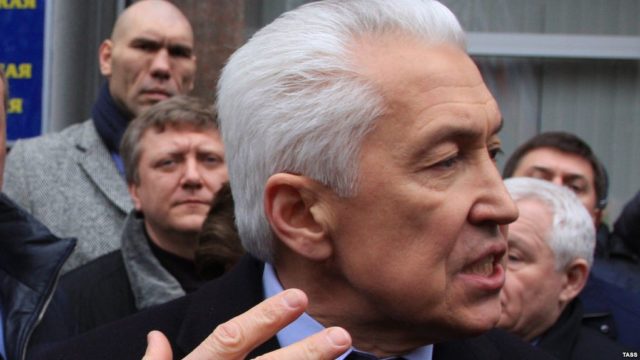
Putin’s Man in Dagestan Faces Increasing Resistance and Opposition at Home
Publication: Eurasia Daily Monitor Volume: 15 Issue: 38
By:

Vladimir Vasilyev, the ethnic Russian Vladimir Putin installed as head of Dagestan, has attracted widespread attention and approval from Moscow for using officials who—like himself—come from outside the republic, to fight the clans and corruption that have long been endemic there. But his continuing pursuit of such outsiders is offending many local people, otherwise inclined to support him, because it suggests that Vasiliyev and Moscow think that the only way to run that North Caucasus republic is as a colony. They appear not interested in or capable of identifying and using local people to govern Dagestan. Ever more of them are angry and beginning to resist Vasilyev’s approach, a development that may mean in the end, and despite all the controversy about what he has done so far, that the republic’s head will have no more success in imposing Moscow’s will than did his predecessors and could be eventually removed in a similar manner.
Those possibilities are highlighted in the remarks of two regional experts to Ramazan Shabkhanov of the OnKavkaz news agency, who ran them under the almost provocative title “Vasilyev Is so Attracted by Tatarstan That He Left Behind Many Honest Dagestani specialists.” Shabkhanov asks even more provocatively: “Will the demonstrative boycott of the Dagestani elites by the outsiders continue for long?” (OnKavkaz, March 4).
Eduard Urazayev, the political observer for Ekho Moskvy in Makhachkala, said that Vasiliyev is doing what Moscow wants, but he is now running into a situation in which there are not enough outsiders to do all the work. So, he must begin to identify Dagestanis who can help him. That will be more difficult, the commentator asserted, because so many of them have been offended by being passed over in favor of outsiders. Milrad Fatullayev, the editor of the Derbent news agency, agreed. Both noted that Vasiliyev’s recent choices of obscure local people for key positions make those appointees look like tokens rather than part of a genuine effort to form a new Dagestani elite, committed to overcoming corruption and developing the economy (OnKavkaz, March 4).
According to Urazayev, the “Dignity” Dagestani political club recently issued a public declaration saying that the continuing influx of outsiders and the elevation of those without experience to nominally prominent positions are “generating serious doubts” about Vasiliyev and his approach. Most members of the Dagestani elite are not so direct in their criticism, because to denounce the republic’s head is almost certainly political death. But that does not mean, Urazayev continued, that they are not increasingly angry and increasingly resistant to “the new broom.”
But that is only part of Vasiliyev’s problem, Urazayev argued. Many of the most notoriously corrupt officials have not lost their positions so far, while others that are less corrupt have, a pattern that is also raising questions among elites as to what is going on. Up to now, the Dagestani population has remained largely supportive of Vasiliyev’s moves, the commentator said, but that could change instantly if the governor makes the mistake of touching something or someone the people feel should be beyond his reach. According to Urazayev, Vasiliyev has not yet made such a mistake, but he easily could, especially since, in relying on outsiders, the governor often does not know exactly where the problems are.
Fatullayev contended that Vasiliyev is being cautious because “the Federal Center more than once has found itself in a situation when it has become a victim of manipulation” by the Dagestani elites. Dagestan’s politicians routinely respond to any challenges by warning Moscow that any steps it takes are fraught with “religious and nationality” consequences and that the best way forward is to send more money south. The current governor is trying to escape from that by using methods employed in Tatarstan and elsewhere. Whether he can succeed, of course, is still very much an open question (OnKavkaz, March 4).
Those are the views of two expert observers, but there are other indications that Vasiliyev may be in trouble. Three of these have surfaced in the last ten days. First, Dagestanis have taken the unusual step of organizing public protests against the actions of the republic’s security forces (siloviki) in arresting people, who are believed to be political victims rather than real criminals (Kavkazsky Uzel, March 13). Second, both serving and retired police in the republic have protested their treatment by Vasiliyev’s government, an indication that one of his chief tools of imposing order may not be under as tight control as he might expect (Kavpolit.com, March 7). And third, and by far the most important, Vasiliyev has begun to use his powers against the Islamic establishment, offending many of the mullahs and imams, but not yet driving them out of their positions of power in the political system and economy—thus setting a stage for the kind of conflict that could quickly spread to Dagestan’s very religious population (OnKavkaz.com, March 11).
Moscow may be receiving a clear signal that everything is not going as well in Dagestan under Vasiliyev as it had hoped. A new survey suggests that Dagestan, long one of the non-Russian republics Putin could depend on to provide him and his party with votes, is projected to have a lower election turnout than any other region or republic in the North Caucasus (Kavkazr.com, March 10). That marks a serious change and it is not one the Kremlin is going to be pleased about, especially as Putin visited Makhachkala today to reaffirm his support for Vasiliyev’s anti-corruption course (Chernovik.net, March 13). Consequently, it is entirely likely that the republic’s head will redouble his efforts, setting the stage for even more conflicts ahead.



